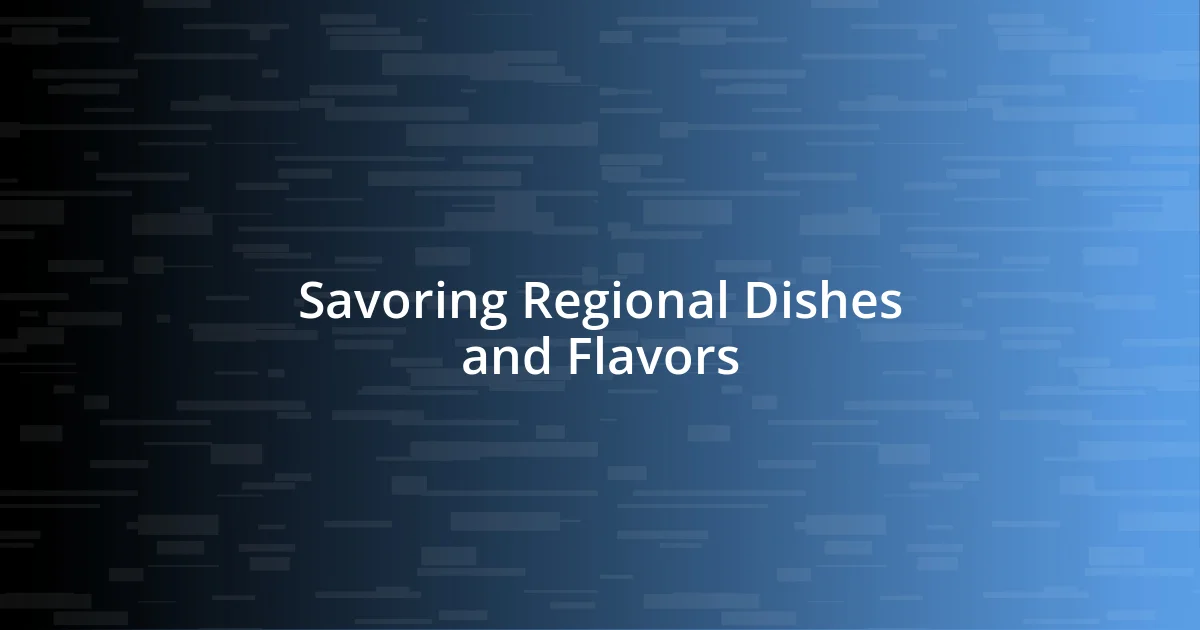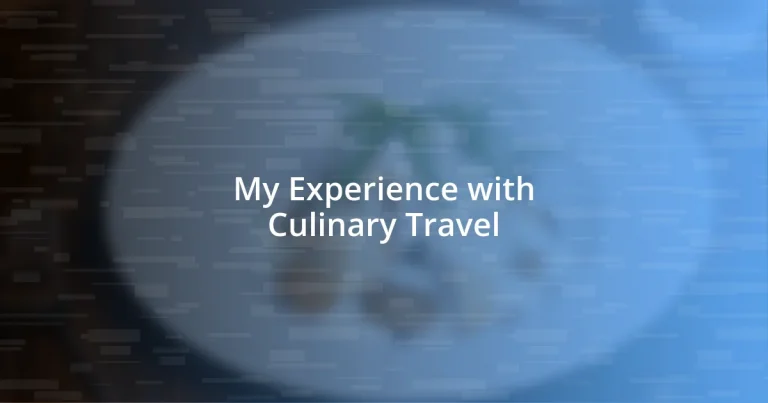Key takeaways:
- Culinary travel deepens cultural connections through shared meals and cooking experiences, transforming food into a bridge between people.
- Choosing culinary destinations involves looking for local favorites, food festivals, and opportunities for hands-on experiences like cooking classes to enrich your journey.
- Reflecting on culinary experiences highlights the emotional connections formed through food, revealing the stories and traditions behind each dish.

Introduction to Culinary Travel
Culinary travel opens up a world of flavors and cultures, inviting us to experience destinations through their food. I still remember the excitement I felt wandering through the bustling street markets of Bangkok, the aroma of fresh spices filling the air. How can we not be drawn in by the rich tapestry of tastes that connect us to a region’s history and people?
In my travels, food has always served as a bridge to understanding local customs. I fondly recall gathering around a dinner table in Tuscany, sharing laughter and stories over homemade pasta and wine. Isn’t it fascinating how a simple meal can tell us so much about a place and its people? Culinary travel invites us not just to taste but to participate in a shared experience.
Exploring a destination through its cuisine creates lasting memories and meaningful connections. I’ve often found that the best travel stories come from those spontaneous moments—a chat with a chef, a cooking class in a local home, or discovering a hidden gem restaurant recommended by locals. Each culinary encounter teaches us something new, doesn’t it?

Choosing Destinations for Culinary Adventures
Choosing the right destination for a culinary adventure can truly elevate your travel experience. For me, it often starts with cravings—sometimes it’s the lure of spicy Indian curries, and other times it’s the comfort of warm Italian bread fresh from the oven. Each destination boasts unique flavors and traditions; it’s like picking a planet in a galaxy filled with diverse, delectable options.
When planning my trips, I also consider local food festivals and markets. I vividly recall stumbling upon a seafood festival in a charming coastal town in Portugal, where I savored freshly grilled sardines while listening to local musicians. The sense of community and joy in sharing that meal with locals is something I actively seek out in my culinary travels—these moments can turn a regular trip into a collection of cherished memories.
Not just the food, but the experiences surrounding it play a significant role as well. I once took a cooking class in a quaint home in a quaint village in Thailand, learning to cook authentic dishes using family recipes passed down through generations. That personal connection, the smiles of my instructors, and my own laughter while trying to master a recipe left a lasting impression, reminding me that culinary adventures are about the people as much as the plates.
| Factor | Consideration |
|---|---|
| Local Cuisine | Research regional dishes and popular ingredients. |
| Food Festivals | Look for local festivals showcasing unique culinary traditions. |
| Cooking Classes | Engage directly with the culture through hands-on experiences. |
| Community Atmosphere | Seek destinations where locals share their food and stories. |

Planning Your Culinary Itinerary
Planning your culinary itinerary requires a thoughtful approach to ensure you savor every bite, reflect on your experiences, and stay open to unexpected delights. On one trip to Spain, I discovered the joy of paella-making in a sunny seaside town with a local chef. The laughter shared among new friends and the sound of sizzling seafood brought the dish to life in a way I hadn’t anticipated. I urge you to leave room for spontaneity—sometimes, the best meals are the ones you stumble upon.
Here are some tips to consider when mapping out your culinary journey:
- Prioritize Local Favorites: Research and list restaurants known for authentic local dishes.
- Incorporate Variety: Factor in different culinary experiences, from street food to fine dining.
- Schedule Flexibility: Allow time in your itinerary for unplanned culinary delights, such as pop-up markets or local tastings.
- Invest in Experiences: Book a few cooking classes or food tours that enable you to immerse yourself in the local culture.
- Connect with Locals: Reach out to local food enthusiasts or online communities for insider recommendations that might not be in travel guides.

Participating in Local Cooking Classes
Participating in local cooking classes can transform your culinary travel experience into something deeply personal. I remember my time in Tuscany, where I found myself elbow-deep in fresh pasta dough, sharing giggles with an elderly woman named Nonna Carla. She taught me to roll and cut the pasta while weaving in stories of her youth—moments like these highlight the joy of cooking together, turning strangers into friends.
What I love about these classes is that they often begin in local markets. Once, in a bustling Thai market, my instructor guided us through vibrant stalls filled with colorful spices and fresh produce. I was taken aback by the range of ingredients I had never seen before. This experience opened my eyes to the roots of the dishes I wanted to create and added a rich layer of authenticity to my cooking.
The most surprising part for me was the emotional connection that forms through food. In Morocco, I spent an afternoon making tagine, and I’ll never forget the warmth in our instructor’s voice as she shared her family’s recipe—cooking became a bridge between her culture and mine. Isn’t it fascinating how food can unite people from different backgrounds? Each meal prepared in those classes tells a story, not just of ingredients, but of heritage and community spirit.

Savoring Regional Dishes and Flavors
Savoring regional dishes is an experience that transcends just taste; it connects you to the culture and heart of a place. I’ll never forget biting into a fresh banh mi during my travels in Vietnam. The combination of fragrant herbs, crispy bread, and tender pork created a harmony of flavors that felt like a warm embrace. Have you ever felt your senses awaken in a moment like that?
During another trip to the coastal town of Amalfi, I decided to indulge in a simple yet exquisite lemon risotto. The dish was crafted right in front of me using locally sourced lemons, each bite infused with the sunshine of the region. I realized that the freshness of the ingredients could truly elevate a meal, bringing the essence of the location to my plate. It made me wonder—how much of what we eat is based on what the land offers at that very moment?
Sometimes, it’s the small street vendors that create the most profound memories. I once stumbled upon a little cart in Mexico City selling tacos al pastor. Watching the vendor slice the marinated meat from the spit while vibrant music filled the air made the experience unforgettable. As I savored each taco topped with fresh pineapple and cilantro, I felt a genuine connection to the street and its stories. Isn’t it amazing how food can turn a moment into a cherished memory, capturing the spirit of a place with every bite?

Reflections on Culinary Travel Experiences
Reflecting on my culinary travel experiences, I often find myself reminiscing about the communal aspects of food. In Croatia, one evening, I joined a family for a traditional dinner, and it was an eye-opener to see how every dish they served was prepared with love and passed down through generations. Eating their homemade dalmatian prosciutto felt like being wrapped in a warm embrace, and sharing stories around the table made me realize how meals forge connections that transcend language and culture.
I also think about the surprises that culinary journeys bring. While hiking in the Andes, I happened upon a small village where locals were preparing chicha, a fermented corn drink. Participating in the process was more than just learning a recipe; it was a glimpse into their daily lives and traditions. Can you imagine the thrill of tasting something so authentic, knowing the effort and history behind every sip? Food isn’t just about consumption; it’s an invitation to understand someone else’s way of life.
Then there are moments that truly tug at the heartstrings, like when I participated in a tea ceremony in Japan. As I whisked the matcha, I felt a deep sense of peace wash over me—it was a practice filled with intention and mindfulness. Each sip of that rich, green tea was not just refreshing; it was a beautiful reminder of the patience and dedication that’s woven into every culinary tradition. How often do we rush through our meals in our daily lives, missing out on this sacred ritual of connection with food and each other?














